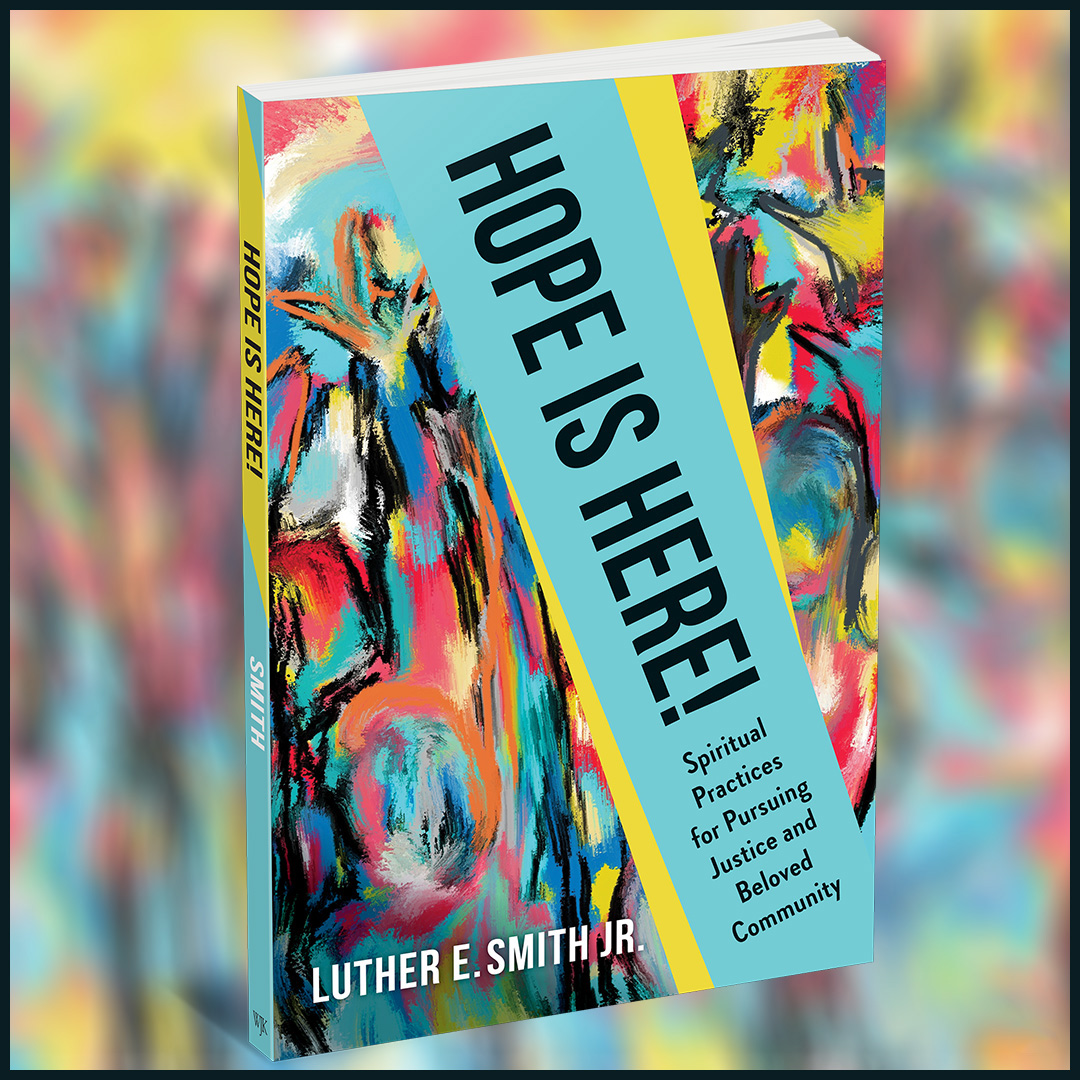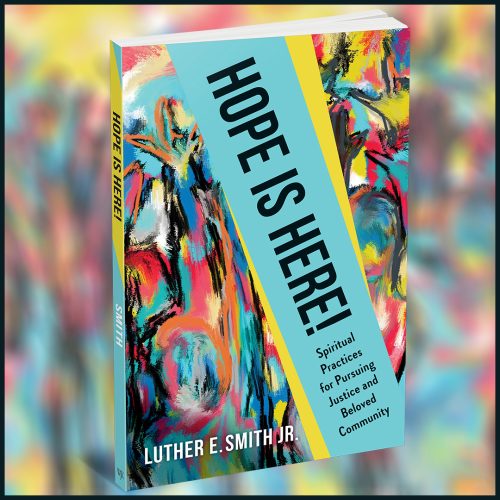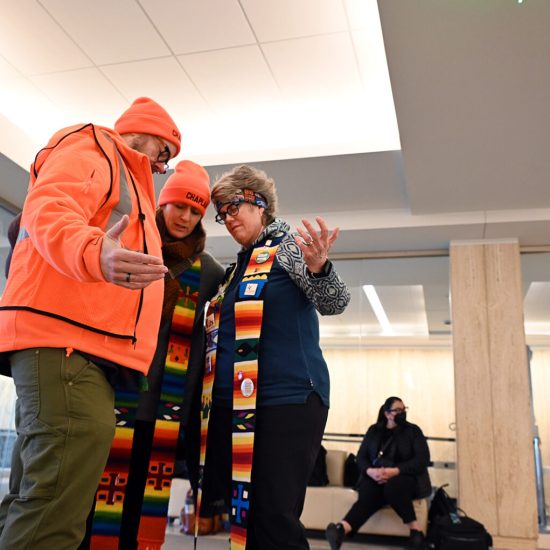

HOPE IS HERE! Spiritual Practices for Pursuing Justice and Beloved Community. By Luther E. Smith Jr. Louisville, KY: Westminster John Knox Press 2023. Xiii + 192 pages.
The word “hope” means different things to different people. For many, hope is synonymous with optimism. While it may include a bit of optimism, in that it is forward-looking, it’s much more than that. The book of Hebrews defines faith as the “assurance of things hoped for, the conviction of things not seen” (Heb. 11:1). Jürgen Moltmann’s theological program that focuses on hope has a strong eschatological bent. Moltmann’s theology envisions a future that God already inhabits and invites us to follow along toward its fulfillment in the realm of God. For people committed to social justice and working toward the creation of the beloved community, hope is the key to pursuing that vision despite the challenges presented by life. So, how do we experience this sense of hope that undergirds the pursuit of justice and the beloved community?

Robert D. Cornwall
Luther Smith, the emeritus professor of Church and Community at Candler School of Theology, at Emory University takes up the question of how we might live into justice and the beloved community. He describes in Hope Is Here! the “spiritual practices for pursuing justice and beloved community. Smith believes that while love is extremely important — remember that Paul called it the greatest characteristic of life — in our day the most important virtue is hope.
Smith shares with us in Hope Is Here! how “hope reveals, empowers, challenges, disrupts, transforms, and enlivens us to God’s desire for our lives and the world” (p. x). As such this book introduces us to the spiritual practices that undergird this work of hope that God invites us into. The destination for this work of hope is the beloved community. The subtitle informs us that this journey requires spiritual formation, and these practices help us pursue this calling. Throughout the book, Smith shares stories of people and communities that experience the kind of transformation he envisions. Thus, this is a very practical book. He helps us see this process played out in real life.
Smith begins in Chapter 1 offering us a definition of hope that is concerned with the here and now. In his view, hope is a force of God that enables us to become the beloved community. He reminds us that this is a journey that will change us if we take it. After offering definitions and outlining the path forward, in Chapter 2, Smith focuses on “Hope’s Work and Its Witnesses.” He speaks of the invitations that enable us to experience the beloved community and personal transformation so that we can become people committed to the pursuit of justice. Part of this process is to hear and share stories that lead to transformation.
If hearing and sharing stories is a spiritual practice, so is “Contemplative Praying” (Chapter 3). Smith believes that prayer can change us by opening our hearts to God’s presence. It is the spiritual foundation for experiencing hope. Thus, “contemplative praying helps us to remember prophetically and emboldens us to engage (enact in our lives) what we have heard and discerned,” and then enables us to pursue further practices (p. 72).
Chapters 4 and 5 spoke to my own spiritual journey that moved from optimism to hope. Chapter 4 is titled “Prophetic Remembering.” According to Luther Smith, “prophetic remembering” is more than remembering past events, it “is submission to the authority and meaning of what we remember,” whether it is commandments, covenants, or the words of the prophets. This leads to prophetic action on our part. It is also more than remembering the past, for he speaks of “remembering the future.” He speaks of prophetic remembering as an “action of healing for society’s crises.” (p. 96). We often hear people, including politicians, speak of the glories of the past that when looked at critically are less than glorious. What we can remember are the promises of God delivered by prophets like Micah and Jeremiah. Thus, he writes that “prophetic remembering entails knowing the prophet’s testimonies and enacting what they say to us about God’s heart for compassion and justice” (p. 100).
In Chapter 5 Smith speaks of “Crossing Identity Boundaries.” He acknowledges that boundaries are important to the process of defining identity. However, we need to clarify our boundaries so we can cross them in pursuit of justice and the beloved community. Hope compels us to do just that so that we might experience “God’s enlivening love in the people and places where God resides” (p. 105). He reminds us that many people don’t choose to cross boundaries for a variety of reasons because to do so may make them strangers in a strange land. When we think of refugees and immigrants, and the challenges facing them, we might better understand what this means. With this in mind, if we embrace hope then we will be in a position to experience and share hospitality. It is in this context that we discover the beloved community.
Chapter 6 is titled “Transforming Conflict.” In this chapter, Smith invites us to befriend conflict (something I struggle with). He notes that conflict has a bad reputation, but conflict, if befriended, can lead to transformation. This happens as conflict opens us up to insights into our relationships. One of the places this occurs is when we cross identity boundaries. It also involves befriending forgiveness, The focus here is on different forms of befriending, which “is the opportunity to be enlivened to life where conflict rages or needs to rage, transformation beckons, and forgiveness heals” (p. 157). He concludes with a word of wisdom suggesting that the practices discussed throughout the book — contemplative praying, prophetic remembering, and crossing identity boundaries — serve as resources for transforming conflict. While hope is primary, he does point out that “love is our motivation for befriending. Love dwells in conflict. Love empowers transformation. Love heals through forgiveness. Love leads us to offer our lives for God’s dream of justice and beloved community.” Thus, “Hope is here in transforming conflict!” (p. 157).
Finally, hope involves celebration in community (Chapter 7: “Celebrating Community”). The endpoint of this journey, which requires the pursuit of justice, is discovering and creating the beloved community. As we enter it, there is reason to celebrate. Our sacred rituals help us do this. So, Smith introduces us to some of the ways we can celebrate, such as through song, communal sabbaths, spiritual retreats, and prayer. This is a good reminder that the work of justice can wear us down if we’re not rooted spiritually. Therefore, celebration is a portal to the beloved community.
If hope is the virtue we need at this moment, though not at the expense of love, to serve as the foundation for the journey toward the beloved community, then Smith offers us a powerful exposition and development of this calling to be people of hope who journey toward the beloved community in Hope Is Here! This is really a most valuable book for the church to engage with. It is meant to be read in community, such that each chapter has discussion questions that can assist in this process. At this point in history, where many look back with nostalgia to what they’ve been led to believe was a golden age (though for many the 1950s was anything but a golden age), here is a word that will help us remember prophetically, but move forward not backward, such that we might truly experience the gift of hope that leads to the beloved community.
This review originally appeared on BobCornwall.com.
Robert D. Cornwall is an ordained minister in the Christian Church (Disciples of Christ). Now retired from his ministry at Central Woodward Christian Church (Disciples of Christ) of Troy, Michigan, he serves as Minister-at-Large in Troy. He holds a Ph.D. in Historical Theology from Fuller Theological Seminary and is the author of numerous books including his latest “Second Thoughts about the Second Coming: Understanding the End Times, Our Future, and Christian Hope” coauthored with Ronald J. Allen. His blog Ponderings on a Faith Journey can be found at www.bobcornwall.com.






